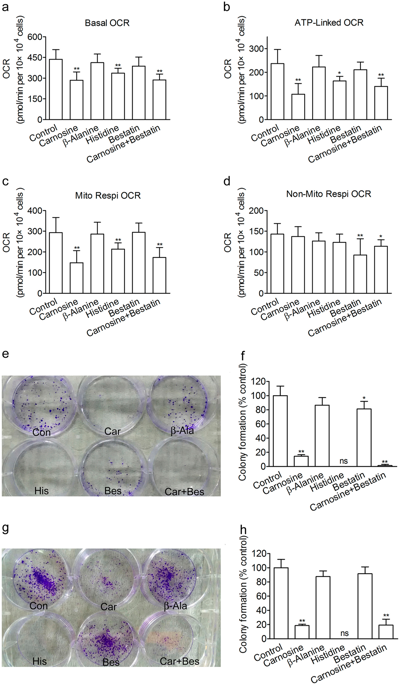当前位置:
X-MOL 学术
›
Acta Pharmacol. Sin.
›
论文详情
Our official English website, www.x-mol.net, welcomes your feedback! (Note: you will need to create a separate account there.)
Profiling and targeting of cellular mitochondrial bioenergetics: inhibition of human gastric cancer cell growth by carnosine.
Acta Pharmacologica Sinica ( IF 8.2 ) Pub Date : 2018-12-18 , DOI: 10.1038/s41401-018-0182-8 Jiao-Yan Cheng 1 , Jian-Bo Yang 1 , Yuan Liu 1 , Min Xu 1 , Yu-Yan Huang 1 , Jing-Jing Zhang 1 , Pei Cao 1 , Jian-Xin Lyu 1, 2 , Yao Shen 1
Acta Pharmacologica Sinica ( IF 8.2 ) Pub Date : 2018-12-18 , DOI: 10.1038/s41401-018-0182-8 Jiao-Yan Cheng 1 , Jian-Bo Yang 1 , Yuan Liu 1 , Min Xu 1 , Yu-Yan Huang 1 , Jing-Jing Zhang 1 , Pei Cao 1 , Jian-Xin Lyu 1, 2 , Yao Shen 1
Affiliation

|
L-Carnosine (β-alanyl-L-histidine) is a naturally occurring dipeptide distributed in various organs of mammalians. We previously showed that carnosine inhibited proliferation of human gastric cancer cells through targeting both mitochondrial bioenergetics and glycolysis pathway. But the mechanism underlying carnosine action on mitochondrial bioenergetics of tumor cells remains unclear. In the current study we investigated the effect of carnosine on the growth of human gastric cancer SGC-7901 cells in vitro and in vivo. We firstly showed that hydrolysis of carnosine was not a prerequisite for its anti-gastric cancer effect. Treatment of SGC-7901 cells with carnosine (20 mmol/L) significantly decreased the activities of mitochondrial respiratory chain complexes I-IV and mitochondrial ATP production, and downregulated 13 proteins involved in mitochondrial bioenergetics. Furthermore, carnosine treatment significantly suppressed the phosphorylation of Akt, while inhibition of Akt activation with GSK690693 significantly reduced the localization of prohibitin-1 (PHB-1) in the mitochondria of SGC-7901 and BGC-823 cells. In addition, we showed that silencing of PHB-1 gene with shRNA markedly reduced the mitochondrial PHB-1 in SGC-7901 cells, and significantly decreased the colony formation capacity and growth rate of the cells. In SGC-7901 cell xenograft nude mice, administration of carnosine (250 mg kg/d, ip, for 3 weeks) significantly inhibited the tumor growth and decreased the expression of mitochondrial PHB-1 in tumor tissue. Taken together, these results suggest that carnosine may act on multiple mitochondrial proteins to down-regulate mitochondrial bioenergetics and then to inhibit the growth and proliferation of SGC-7901 and BGC-823 cells.
中文翻译:

细胞线粒体生物能学的分析和靶向:肌肽对人胃癌细胞生长的抑制。
L-肌肽(β-丙氨酰-L-组氨酸)是一种天然存在的二肽,分布在哺乳动物的各个器官中。我们之前表明,肌肽通过靶向线粒体生物能学和糖酵解途径抑制人胃癌细胞的增殖。但肌肽对肿瘤细胞线粒体生物能学的作用机制尚不清楚。在目前的研究中,我们研究了肌肽对体外和体内人胃癌 SGC-7901 细胞生长的影响。我们首先表明肌肽的水解不是其抗胃癌作用的先决条件。用肌肽 (20 mmol/L) 处理 SGC-7901 细胞显着降低线粒体呼吸链复合物 I-IV 的活性和线粒体 ATP 的产生,并下调参与线粒体生物能量学的 13 种蛋白质。此外,肌肽处理显着抑制 Akt 的磷酸化,而用 GSK690693 抑制 Akt 激活显着降低了 SGC-7901 和 BGC-823 细胞线粒体中抑制素-1 (PHB-1) 的定位。此外,我们发现用 shRNA 沉默 PHB-1 基因可显着降低 SGC-7901 细胞中的线粒体 PHB-1,并显着降低细胞的集落形成能力和生长速度。在 SGC-7901 细胞异种移植裸鼠中,肌肽(250 mg kg/d,ip,3 周)显着抑制肿瘤生长并降低肿瘤组织中线粒体 PHB-1 的表达。综合起来,
更新日期:2019-05-16
中文翻译:

细胞线粒体生物能学的分析和靶向:肌肽对人胃癌细胞生长的抑制。
L-肌肽(β-丙氨酰-L-组氨酸)是一种天然存在的二肽,分布在哺乳动物的各个器官中。我们之前表明,肌肽通过靶向线粒体生物能学和糖酵解途径抑制人胃癌细胞的增殖。但肌肽对肿瘤细胞线粒体生物能学的作用机制尚不清楚。在目前的研究中,我们研究了肌肽对体外和体内人胃癌 SGC-7901 细胞生长的影响。我们首先表明肌肽的水解不是其抗胃癌作用的先决条件。用肌肽 (20 mmol/L) 处理 SGC-7901 细胞显着降低线粒体呼吸链复合物 I-IV 的活性和线粒体 ATP 的产生,并下调参与线粒体生物能量学的 13 种蛋白质。此外,肌肽处理显着抑制 Akt 的磷酸化,而用 GSK690693 抑制 Akt 激活显着降低了 SGC-7901 和 BGC-823 细胞线粒体中抑制素-1 (PHB-1) 的定位。此外,我们发现用 shRNA 沉默 PHB-1 基因可显着降低 SGC-7901 细胞中的线粒体 PHB-1,并显着降低细胞的集落形成能力和生长速度。在 SGC-7901 细胞异种移植裸鼠中,肌肽(250 mg kg/d,ip,3 周)显着抑制肿瘤生长并降低肿瘤组织中线粒体 PHB-1 的表达。综合起来,



























 京公网安备 11010802027423号
京公网安备 11010802027423号